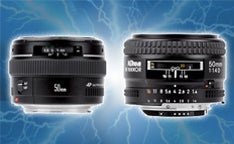Battle of the 50’s
We compare 50mm lenses from the top brands.

We may earn revenue from the products available on this page and participate in affiliate programs. Learn more ›
Canon
EF 50mm f/1.4
USM AF
Nikon
50mm f/1.4D AF
Pentax
SMCP-FA 50mm
f/1.4 AF
Sigma
50mm f/1.4
EX DG HSM AF
Sony
50mm
f/1.4 AF
Tested Focal Length and Maximum Aperture
51.68mm f/1.46
51.68mm f/1.46
51.93mm f/1.45
48.00mm f/1.48
51.58mm f/1.46
Mounts
Canon AF
Nikon AF, Fujifilm AF
Pentax AF, Samsung AF
Canon AF, Nikon AF, Pentax AF, Sigma AF, Sony AF
Sony AF, Minolta AF
Weight
0.62 lb
0.51 lb
0.50 lb
1.16 lb
0.49 lb
Length
1.96 in.
1.65 in.
1.44 in.
2.68 in.
1.67 in.
Filter Size
58mm
52mm
49mm
77mm
55mm
Certified Test Results
SQF Rating
APS: Excellent
Full-frame: Excellent
APS: Excellent
Full-frame: Excellent
APS: Excellent
Full-frame: Excellent
APS: Excellent
Full-frame: Excellent
APS: Excellent
Full-frame: Excellent
Distortion
APS: Imperceptible barrel (0.10%) Full-frame: Slight barrel (0.24%)
APS: Imperceptible barrel (0.10%) Full-frame: Slight barrel (0.22%)
APS: Imperceptible barrel (0.08%) Full-frame: n.a.*
APS: Imperceptible barrel (0.10%) Full-frame: Slight barrel (0.21%)
APS: Imperceptible barrel (0.10%) Full-frame: Slight barrel (0.26%)
Light Falloff Gone By…
APS: f/1.6 Full-frame: f/2.8
APS: f/1.6 Full-frame: f/2.8
APS: f/2.0 Full-frame: n.a.*
APS: f/1.6 Full-frame: f/2.8
APS: f/1.7 Full-frame: f/2.8
Magnification Ratio
1:6.52
1:6.20
1:6.00
1:6.29
1:6.16
Close-Focusing Distance
17.75 in.
17.12 in.
16.75 in.
16.25 in.
17.12 in.
Comments
Canon’s only lens with a micro USM AF motor that also allows full-time MF.
First sold in 1990, it’ll soon be replaced by a G-type 50mm to street for $440.
From the film era, our leastexpensive lens boasts the best distortion control.
The most costly here, it’s physically the largest and, by a hair, the sharpest.
The lightest 50mm f/1.4, it’s very similar to the film-era Minolta Maxxum 50mm.
Street Price
$320
$300
$200
$500
$350
* Results not available because there is no full-frame DSLR for this lens
The Digital-Only Duo
| While there’s a whole nation of current and discontinued full-frame 50mm f/1.4s out there, lens makers are only just beginning to produce high-speed normal primes for DSL Rs that have smaller sensors. So far, there are just two: the Sigma 30mm f/1.4 EX DC HSM AF and Panasonic Leica D Summilux 25mm f/1.4 AF . Sigma’s lens scales up to 45-48mm on APS-sized sensors; the Panasonic to 50mm on Four Thirds DSL Rs. Together, they’re the fastest digital-only lenses available today, and their designs are much newer than those of most high-speed normals. As a result, they deliver higher contrast and sharpness than their film-era counterparts, and, depending on the camera body, faster AF speeds, too. | ||
| SIGMA: Available in most popular lensmounts (including Four Thirds), the Sigma 30mm (released in the winter of 2004-05 and streeting for $433) was the first Sigma non-tele prime to benefit from the sharpening power of SL D (Special Low Dispersion) glass. Like Sigma’s full-frame 50mm f/1.4, it’s large for the class. That’s because of its HSM focusing motor and larger glass elements, which deliver less softening and vignetting along the edges when used at maximum aperture. | ||
| PANASONIC: Among the most expensive of all high-speed normals (digital or full-frame), the Panasonic-made, Leica designed 25mm f/1.4 ($800, street) is as sharp and contrasty as the competition, but its distortion control — as you would expect from Leica — is top-drawer. The Panasonic produced barrel distortion in the Imperceptible range (0.09%), in contrast to the Sigma’s Visible range (0.78%). That makes the Panasonic one of the best of all high-speed normal lenses, digital or full-frame. |